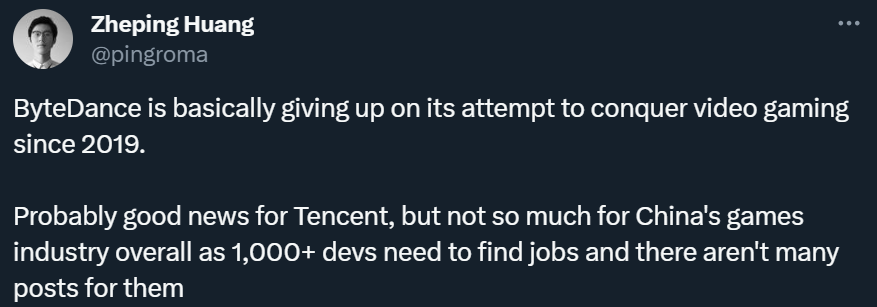
What are the top 5 significant layoffs in gaming in 2023? (Generated with AI)
Top 5 significant layoffs in gaming in 2023
- 2023 has witnessed widespread layoffs in the gaming industry, with over 6,100 employees affected.
- Gaming giants like Unity and Epic Games restructure in 2023, balancing job cuts with business stability.
- 2023’s gaming sector grapples with layoffs and strategy changes due to economic volatility.
Throughout 2023, a significant trend of layoffs has swept across various industries, notably impacting the global workforce and becoming a focal point of discussion and ongoing strategy. Once lauded for its growth and innovation, the gaming industry has been particularly affected, with numerous well-known companies announcing layoffs.
These cuts, influenced by shifts in consumer behavior, technological progress, and economic pressures, reflect a broader trend within the global economy, highlighting the vulnerability of even dynamic sectors to economic uncertainties and strategic changes.
2023…A year of significant layoffs in the gaming industry
The gaming sector has experienced considerable headcount reductions due to these economic challenges. As reported by Farhan Noor’s videogamelayoffs.com, over 6,100 gaming employees have been laid off in 2023 so far. However, this figure might be an underestimation, as many companies have not fully disclosed the full extent of their job cuts.
Tech Wire Asia delves into some notable layoffs within the gaming industry this year (so far), underscoring the sector’s response to the prevailing economic climate.
Unity
In 2023, Unity Technologies, a major player in the gaming industry, announced two significant rounds of layoffs as part of its workforce restructuring efforts. The first round in January impacted 284 employees, attributed by CEO John Riccitiello to economic conditions and a need for strategic investment focus, mainly affecting administrative roles and discontinuing certain projects.
A subsequent layoff in May saw an additional 600 employees, approximately 8% of the workforce, let go, aligning with Unity’s goals to streamline operations and reduce its office footprint from 58 to 30 amid recession concerns. This brought Unity’s total staff to around 7,000, following a previous reduction of about 200 employees in June 2022.
Despite reporting its first profitable quarter, Unity is implementing restructuring plans, including team changes and reducing office space, which are expected to incur around US$26 million in charges. The company’s Q3 earnings report highlighted further cost-saving measures and a conservative outlook for 2023. Unity also faced challenges within the game development community due to a controversial pricing model, leading to CEO Riccitiello’s retirement and pricing strategy revisions.
These changes at Unity reflect a broader trend of instability in the video game industry, marked by layoffs, shutdowns, and restructuring, even amid mixed financial performances. That highlights the sector’s volatility and its susceptibility to broader economic uncertainties.
Epic Games
Epic Games has announced a significant workforce reduction, laying off around 16% of its employees, totaling around 830 people. This move is part of the company’s strategy to achieve financial sustainability amid heavy investments in the evolution of Epic and the development of Fortnite as a metaverse-inspired ecosystem. The CEO acknowledged the need for layoffs, contrary to their initial optimism, due to changes in Fortnite‘s economic model, shifting towards a creator-driven model with significant revenue sharing.

Epic Games is laying off 830 people. (Source – Shutterstock)
Efforts to reduce costs, including net zero hiring and decreased spending on marketing and events, proved insufficient, leading to the decision to lay off staff. Additionally, Epic is restructuring its portfolio, with Bandcamp being acquired by Songtradr and SuperAwesome’s advertising business becoming independent, while Kids Web Services remains with Epic.
Epic is offering substantial severance packages to affected employees, including six months of base pay, healthcare benefits, accelerated stock options vesting, and other support services. Despite the layoffs, the core development teams at Epic are largely unaffected, with most of the job cuts impacting non-core departments. Some projects may experience delays though, due to reduced resources.
Epic assured the market that these layoffs have financially stabilized the company, with no further workforce reductions planned. The company will continue hiring for essential roles while maintaining net-zero hiring at its revised size, reaffirming its commitment to ongoing projects and investments in the gaming and development sectors.
Bytedance
ByteDance, the parent company of TikTok, is significantly downsizing its gaming division, Nuverse, due to lackluster performance over the past two years. This restructuring marks a significant shift from ByteDance’s initial strategy, where it positioned its gaming pursuits as a critical business unit to compete with industry giants like Tencent, NetEase, and MiHoYo.
The downsizing process began with widespread layoffs, creating uncertainty for many Nuverse employees. As of 2021, Nuverse had grown to a team of about 3,000 people, and its size had remained relatively stable. ByteDance had made significant investments in the gaming sector, including the US$4 billion acquisition of Moonton, a Shanghai-based studio. Despite this, ByteDance is reportedly considering selling Moonton, with negotiations in progress with a Saudi Arabian firm.
While there were initial speculations about a complete shutdown of Nuverse and a withdrawal from mainstream gaming, ByteDance’s statements suggest that some segments of the gaming team might continue operations.
ByteDance’s challenges in the gaming industry, including its virtual reality efforts with Pico, highlight the limitations of its data-driven strategy, which is successful in the short-video app market but less so in the gaming sector, where success relies on longer, more creative processes. The gaming industry’s unpredictable nature contrasts with the instant gratification model of TikTok’s videos.

Bytedance gives up on the gaming industry. (Source – X).
Nuverse’s lack of significant commercial successes has likely led to reassessment by ByteDance’s management, especially given the company’s status as a private entity amid US-China tensions. The wider Chinese internet industry, including the gaming sector, faces additional pressures from regulatory crackdowns and economic challenges, such as the halt in gaming license approvals and constrained recovery due to macroeconomic factors.
Amazon
Amazon has initiated another series of layoffs, impacting over 180 positions, as part of a broader reorganization of its gaming strategy. This includes discontinuing the Crown channel, a Twitch channel known for its TV-like programming, and closing down the Game Growth group, which provided marketing support to gaming creators.
Christoph Hartmann, VP of Amazon Games, described these changes as a strategic pivot to enhance Prime Gaming, with a renewed focus on offering free games to subscribers. This shift responds to customer preferences for free monthly game offerings.
These recent layoffs follow a previous round in April that laid off around 100 roles within Amazon’s games division, underscoring the company’s refocus on key growth areas.
The Crown channel, a component of this restructuring, faced criticism for artificially inflating viewer numbers, which raised questions about its actual viewer engagement and effectiveness as an advertising platform.
According to Amazon spokesperson Brittney Hefner, this restructuring effort aims to concentrate on Amazon’s primary gaming business activities. This strategy includes developing flagship in-house games like New World and a forthcoming Lord of the Rings title, and publishing games from external developers. These moves signify a significant strategic shift in Amazon’s gaming approach, prioritizing in-house game development and publishing.
Electronic Arts
Electronic Arts (EA) plans to lay off over 700 employees, constituting around 6% of its approximately 12,900-strong global workforce. CEO Andrew Wilson announced this decision despite EA reporting a US$1.3 billion gross profit in the latest fiscal quarter. The company simultaneously lowered its full-year profit forecasts, despite increases in both revenue and profit over the previous year.
Wilson acknowledged EA’s strong position despite macroeconomic challenges and claimed the company was gaining momentum. Nevertheless, the layoffs are part of a strategic shift, refocusing on projects that align with EA’s core strategies of developing games for large online communities, interactive storytelling, and enhancing tools for community and creator engagement.
Successes like The Sims 4, EA Sports FIFA 23, and Apex Legends have been highlights for EA, and the company aims to continue its focus on major projects such as Madden 23, Battlefield 2042, the upcoming Star Wars Jedi: Survivor, and The Sims 5. These layoffs are not directly linked to EA’s decision to remove older Battlefield games from online stores.
Wilson added that some employees might be reassigned to other projects, while those not reassigned will receive severance and additional benefits. These staffing changes began earlier in the quarter and are expected to extend into the next fiscal year beginning in October. Earlier in February, EA laid off 200 Apex Legends QA testers.
Experts note that while large companies often justify layoffs as responses to slowing growth, such measures don’t always result in cost savings and might mirror industry trends. EA estimates these layoffs will cost between US$170 million and US$200 million, per a recent financial statement. EA’s decision to downsize reflects a broader trend of layoffs and restructuring within the gaming industry, driven by various economic and strategic factors.

A user left disappointed with the decision from EA. (Source – X)
Conclusion
The gaming industry in 2023 has faced a turbulent period, marked by significant layoffs and strategic realignments. Companies are adapting to the evolving economic landscape, consumer preferences, and technological advancements. Despite the challenges, these changes might pave the way for a more resilient and innovative gaming sector in the future. The impact of these layoffs extends beyond immediate job losses, influencing the industry’s strategic direction and potentially reshaping the gaming landscape as we know it.
READ MORE
- 3 Steps to Successfully Automate Copilot for Microsoft 365 Implementation
- Trustworthy AI – the Promise of Enterprise-Friendly Generative Machine Learning with Dell and NVIDIA
- Strategies for Democratizing GenAI
- The criticality of endpoint management in cybersecurity and operations
- Ethical AI: The renewed importance of safeguarding data and customer privacy in Generative AI applications




